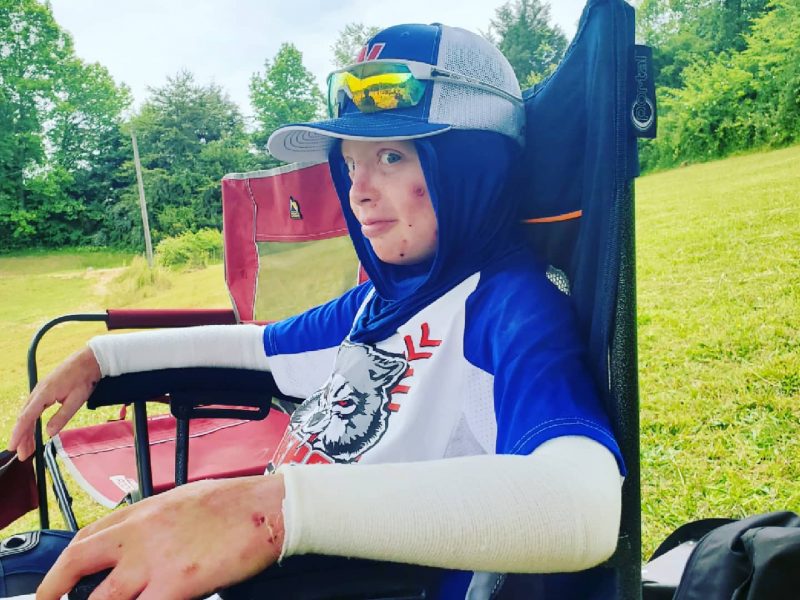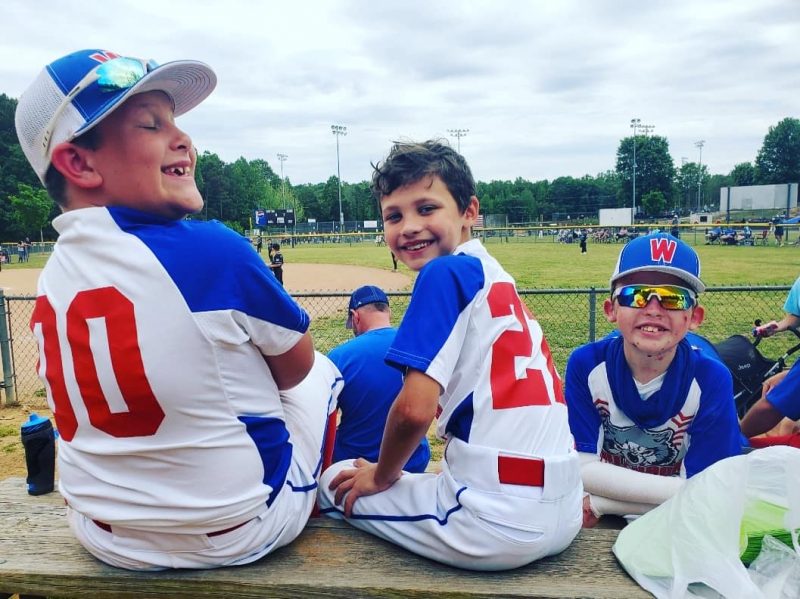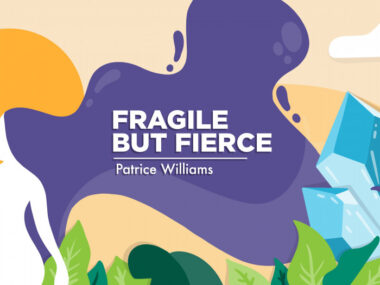Choose Kindness When Faced With Differences
Written by |

“Did a wolf attack your face?”
That’s what the preteen asked my son Jonah, who was born with junctional epidermolysis bullosa, when Jonah approached their group to play whiffle ball. It was between his brother’s Carolina Wolfpack baseball games. Jonah was wearing the team’s jersey, as he is an honorary member and co-manager. Emblazoned on the front of the jersey is a wolf.

Jonah wears his Wolfpack jersey at last weekend’s ballgames. (Photo by Patrice Williams)
And so thinking he was funny, the kid asked him, “Did a wolf attack your face?”
I watched from afar, because he’s too old now to let me fight his battles. I had seen him eyeing the group, wanting to jump in and play. I had seen him wait and wait, building up the courage to approach them. And I watched as he bravely did. I saw them gesture toward his face and question him, although I couldn’t tell what they were saying at the time. I saw Jonah laugh something off, explaining.
And then, one of the nice ones let him join their team. And when Jonah came up to bat, he took the opposing pitcher’s place. He pitched to Jonah himself to ensure that Jonah didn’t get hit. Later, I questioned Jonah about the interaction, hoping it had been a good one, but curious as to why he only played with them for one at-bat.
It was because of that first boy. The one who asked. But it wasn’t because he asked. We’re used to that. It was the way he asked.
Y’all. I’m tired. I’m so tired. I want to tear up as I sit and type these words after a too-long day at work, lumber prices that are rising as we finally begin building our house after months of waiting, a blown head gasket in our car, and the news today that the engine will need to be replaced.
So, maybe it’s not a good time to be evaluating the words and motives of a clueless preteen we randomly met at the ballfield.
But why did a kid, one that old and with so much going for him, ask that way? And this, a couple of weeks after a 6-year-old who saw Jonah kept exclaiming loudly, over and over, “OH MY GOD. What happened to your face?!”
I raised my voice at that first-grader. “Why don’t you try being KIND?!” Because lately, it feels like kindness is a dying virtue. And I’m so tired. I’m tired of this world’s mouthy, know-it-all jerks.
It is OK to wonder. It is OK to be curious. We’d rather people ask than stare and make assumptions. But for goodness’ sake, be kind.
Teach your kids to be kind. Make sure they don’t live such sheltered lives that they don’t know what to do or how to act in uncomfortable situations. Create situations and opportunities for them to be around people who don’t look like them, think like them, act like them, aren’t healthy like them, or don’t have the same skin as them. Teach them the appropriate way to ask questions instead of hushing them up while they stare and point.
Teach them to feel compassion (not pity), to practice inclusion, to treat different kids like all kids. And teach them that when they do those things, they aren’t doing that other child a favor or taking the moral high road. That other child could bless their own socks off if they would let him. His friendship would be the favor. His funny wit and compassionate heart would be their gain.
Teach your kids to see the divine in every other human. Help them to see beauty and value in differences. Let them know that curiosity is a good thing, and that there are gentle, humble ways to handle hard situations.
Lead them by example, and let’s resurrect kindness. There’s never been a better time.

Jonah, right, with two of his very kind Wolfpack teammates. (Photo by Patrice Williams)
***
Note: Epidermolysis Bullosa Today is strictly a news and information website about the disease. It does not provide medical advice, diagnosis, or treatment. This content is not intended to be a substitute for professional medical advice, diagnosis, or treatment. Always seek the advice of your physician or other qualified health provider with any questions you may have regarding a medical condition. Never disregard professional medical advice or delay in seeking it because of something you have read on this website. The opinions expressed in this column are not those of Epidermolysis Bullosa Today or its parent company, Bionews, and are intended to spark discussion about issues pertaining to epidermolysis bullosa.






Leave a comment
Fill in the required fields to post. Your email address will not be published.